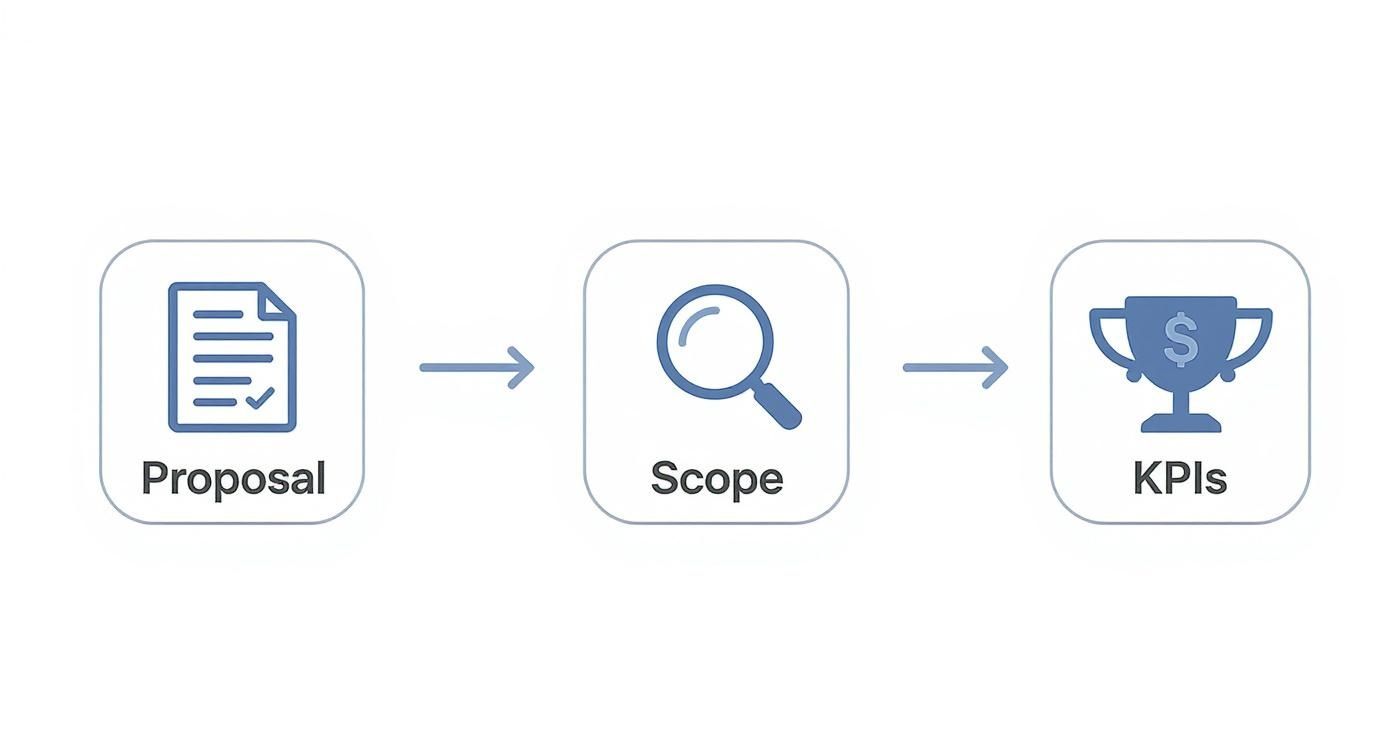So, what exactly is a marketing analytics agency? Think of them as specialized partners who help businesses—especially B2B SaaS firms—turn mountains of complex user data into clear, actionable growth strategies. They don't just hand you a dashboard; they dig deep to uncover insights on customer journeys, revenue attribution, and predictive trends.
This is the stuff that actually helps you optimize your marketing spend and grow smarter.
Why Generic Agencies Fail B2B SaaS

Let’s be honest, standard marketing reports just don’t cut it anymore. B2B SaaS companies are swimming in data, and a generalist agency often misses the critical nuances hiding just beneath the surface.
Sure, they might deliver vanity metrics like traffic and leads. But they almost always struggle to connect those numbers to what really matters: Monthly Recurring Revenue (MRR), Customer Lifetime Value (LTV), and churn.
The core challenge for any SaaS business is translating huge volumes of user data into a clear roadmap for growth. And that’s exactly where a one-size-fits-all approach completely falls apart.
The Unique Data Puzzles in SaaS
The B2B SaaS customer journey is never a straight line. It’s a winding path with multiple touchpoints, long sales cycles, and a whole cast of different stakeholders. A generalist agency might track a demo request, but a specialized partner understands how to attribute value across every single interaction—from an initial blog view months ago to the final sales call.
This distinction is mission-critical for effective digital marketing for SaaS companies, because every dollar you spend needs to be justified against long-term revenue goals.
Think about this all-too-common scenario: A SaaS company pours money into content marketing and generates thousands of leads. The generic agency’s report looks great—lead volume is up, cost-per-lead is down. But then the sales team drops a bomb: these leads have a terrible conversion rate and a sky-high churn rate after they sign up.
The real problem was never lead generation; it was lead quality and its direct link to LTV. A specialized analytics agency digs way deeper. They build models to answer the questions that actually move the needle:
- Which content channels produce customers with the highest LTV?
- What specific user behaviors during a trial correlate with long-term retention?
- How does our marketing spend influence Expansion MRR from existing accounts?
A true analytics partner moves beyond historical data—what happened—to predictive insights that guide what you should do next. They help you invest in channels that attract profitable, long-term customers, not just fleeting leads.
To put it another way, a generalist agency might help you fill the top of your funnel, while a specialist ensures the customers who come out the bottom are the right ones.
Here's a quick look at the key differences:
Generalist Agency vs Analytics Specialist Agency
The takeaway is simple: if you want to connect marketing activities directly to revenue and customer value, you need a partner who lives and breathes SaaS data.
The Growing Need for Specialization
This demand for deeper, more strategic insights is fueling a massive expansion in the market. The marketing analytics service industry is projected to jump from $5.35 billion in 2024 to $6.2 billion in 2025, which is a 15.9% compound annual growth rate.
This isn't just a random trend. It signals a major shift in how businesses operate. Companies are realizing they need data-driven decision-making to optimize every dollar spent and deliver the hyper-personalized journeys customers now expect.
Define Your Goals Before You Start Searching

Before you even think about Googling for marketing analytics agencies, the most important work needs to happen inside your own company.
Seriously. Approaching potential partners without a crystal-clear set of goals is like asking a builder to construct a house without blueprints. Sure, you’ll get something, but it almost certainly won't be what you actually need. This is where most partnerships go wrong before they even begin.
This initial self-assessment is what separates a successful engagement from a frustrating and expensive one. You have to define what success looks like for your SaaS business with extreme clarity. That means getting way past vague objectives like "we want better data." You need to nail down specific business outcomes tied directly to your growth strategy.
Identify Your Core Business Questions
Get your marketing, sales, and product leads in a room (virtual or otherwise) and start asking the hard questions. The whole point is to pinpoint the exact blind spots where a lack of data is forcing you to make critical decisions on guesswork alone.
Here are a few questions to get the conversation started:
- Customer Acquisition: Are we just throwing money at ads hoping to lower our Customer Acquisition Cost (CAC)? Do we have any idea which channels bring in customers with the highest Lifetime Value (LTV)?
- Marketing Mix: Can we confidently say what our content marketing is actually contributing to revenue versus our paid search campaigns? Are we investing in the right mix or just the one we're most comfortable with?
- Retention and Churn: What do our best customers do in their first week? Is there a specific behavior during the trial period that signals they'll stick around? At what point do people typically churn, and which marketing touchpoints did they ignore right before they left?
The answers to these questions are the foundation of your project scope. A great agency doesn't just deliver dashboards; they provide answers to the specific, high-stakes questions that are holding your business back.
Assess Your Internal Readiness
Okay, so you know what you want to achieve. Now you have to be brutally honest about your ability to support the project internally. Even the most brilliant agency can't work magic if your internal house isn't in order.
A quick audit of your readiness should cover two key areas:
- Data Hygiene: Is your data clean, organized, and accessible? If your CRM is a dumpster fire of duplicate contacts and inconsistent field entries, you need to own that and probably fix it first.
- Team Capacity: Who on your team is going to own this relationship? This person will be the agency's primary point of contact. Do they have the bandwidth and the authority to provide access, answer questions, and actually implement the recommendations?
When you approach agencies with this level of clarity—knowing your goals and your internal state—you instantly position yourself as a serious, strategic partner. It lets you skip the fluff and have a much more productive conversation focused on solutions, not just diagnosing problems.
How to Vet an Agency's SaaS Experience

Just because an agency has "analytics" in its name doesn't mean they get SaaS. Far from it.
The metrics that matter for an e-commerce store or a local plumber are worlds apart from what drives a B2B SaaS company. You need a partner who speaks your language—a language built on recurring revenue, complex sales cycles, and long-term customer value.
This means you have to dig deeper than their homepage case studies and move the conversation past flashy dashboards. It's time to find out if they have real, demonstrable experience with the SaaS business model.
Questions That Reveal True SaaS Expertise
When you're interviewing potential agencies, your goal is to probe their practical knowledge. Don't be afraid to get specific. A true SaaS expert will welcome the details; a generalist will start to stumble.
Kick things off with questions that test their grasp of core SaaS metrics:
- Churn & Retention: "Walk me through a time you helped a SaaS client identify the leading indicators of customer churn. What data did you use, and what actionable strategies came out of that analysis?"
- Expansion MRR: "Describe your approach to attributing Expansion MRR. How do you actually connect marketing efforts to upsells and cross-sells within an existing customer base?"
- LTV to CAC Ratio: "How do you model Lifetime Value for a SaaS company with multiple pricing tiers? What's your process for ensuring the LTV:CAC ratio informs channel investment decisions?"
If an agency can't give you confident, detailed answers here, they probably don't have the specialized experience you need. Their responses should prove they think strategically about your data, not just report on it. For a wider view on what's possible, you can explore insights from broader web analytics consulting.
Assessing Their Tech Stack Familiarity
Beyond business metrics, their technical skills are non-negotiable. Your data lives in a specific tech stack, and their ability to integrate with and leverage those tools is critical.
Get specific about your ecosystem. If you use HubSpot for marketing automation, Salesforce as your CRM, and Segment as your Customer Data Platform (CDP), ask them about their direct experience with that combination.
Can they show you concrete examples of how they've unified data from these kinds of disparate sources to create a single source of truth?
A great agency won't just work with your stack; they'll recommend ways to optimize it. They should be able to discuss complex data integration challenges and propose clear, effective solutions on the spot.
It's also a good sign when agencies use specialized solutions for marketing agencies themselves. This shows a commitment to their craft and an understanding of the unique reporting and attribution needs that come with serving B2B SaaS clients.
Probing for Predictive Capabilities and AI Integration
Finally, the best agencies are moving beyond just reporting on what happened last quarter. They're looking ahead.
The integration of artificial intelligence has become a huge factor here. In fact, 63% of marketers are now using generative AI in their day-to-day operations. This is more than a buzzword; it's a fundamental shift in analytical power.
Ask potential partners how they use AI and machine learning to forecast trends, identify high-value customer segments, or automate campaign optimizations. You're looking for a partner who can help you anticipate the future, not just analyze the past.
Understanding Agency Pricing and Deliverables
Figuring out the right agency fit means you have to get comfortable with how they structure their pricing and what they actually deliver. This isn't just about comparing price tags; it's about matching their engagement model to where your business is right now.
Most marketing analytics agencies operate on one of two tracks: project-based work or monthly retainers. Getting this choice wrong is a fast way to burn through your budget with misaligned expectations. You need to know exactly what you’re signing up for before any proposal hits your desk.
Deciphering Common Pricing Models
Project-based work is like calling in a specialist for a specific operation. Maybe you need a full audit of your messy data stack or a sophisticated attribution model built from the ground up. You pay a fixed fee, get a clear one-time deliverable, and you're done.
This model is perfect for startups or teams who need foundational work done without locking into a long-term commitment. It’s a surgical strike.
A monthly retainer, on the other hand, is a true partnership. This is for SaaS companies that need someone in their corner week after week, providing ongoing strategic advice, monitoring performance, and delivering regular reports that actually mean something. You're not just buying a PDF; you're embedding a team of specialists into your marketing function.
Retainers usually start around $5,000 per month and can go way up depending on the scope of work and the team involved.
The single most important thing is making sure the agency's performance is tied to your success. They need their own KPIs, not just a mandate to report on your marketing metrics. If they win, you should be winning bigger.
To help you navigate the options, here’s a quick breakdown of the pricing models you'll likely encounter:
Agency Pricing Models for SaaS Analytics
Choosing the right model is less about the cost and more about what you're trying to achieve. Don't pay for a retainer if all you need is a one-time setup, and don't expect deep strategic partnership from a small project-based gig.
Beyond the Price Tag: What to Scrutinize in a Proposal
A proposal is more than a number—it’s the blueprint for your relationship. When you get a scope of work (SOW), your job is to read between the lines, not just look at the total cost.
Here’s what to zero in on:
- Clarity of Deliverables: The proposal has to be specific. "Monthly report" is a red flag. It should say, "A monthly performance report detailing channel-specific ROAS, cohort analysis of new trial sign-ups, and strategic recommendations for the next 30 days." Big difference.
- Scope of Strategic Support: Are you getting a dedicated strategist? How often will you actually talk to them? Is ad-hoc analysis included, or will every small question trigger another invoice? This is what separates a true partner from a simple vendor.
- Performance Metrics: The proposal must outline how the agency will measure its own success. This is all about accountability. It shows you how they think about driving results and is a great window into their approach for how to measure marketing ROI.
Ultimately, the best agencies don't just sell analytics reports. They sell you a clear, data-driven path to growth, backed by a transparent pricing model and concrete deliverables that actually help you hit your numbers.
Making the Final Call and Onboarding for Success
You’ve done the hard work. The proposals have been vetted, the contenders have been grilled, and now you’re down to the final few marketing analytics agencies. It's tempting to pick the one with the slickest slide deck, but this final stage is all about separating the talkers from the doers.
This is where you move from theory to reality. Don't rush it. The last few steps are what set you up for a partnership that actually delivers results, not just reports.
Beyond the Case Study
Case studies are great, but reference checks are where you get the unvarnished truth. The key is to ask questions that force them to go beyond generic praise like, "Yeah, they were great to work with."
You need to dig deeper. Try asking questions that uncover how they really operate:
- "Can you give me an example of a time the agency found an unexpected insight that actually changed your marketing strategy?"
- "How did their work directly impact a core KPI like MRR or LTV? I'm looking for a specific instance."
- "Walk me through a time when a project hit a snag. How did they communicate the problem and what did they do to fix it?"
These kinds of questions get you concrete examples, not just positive sentiment. You're looking for a proactive partner who thinks about your business, not just a reactive vendor waiting for instructions.
A Low-Risk Trial Run
Before you sign on the dotted line for a 12-month retainer, propose a paid discovery project. Think of it as a small, focused trial run to see how you actually work together. This could be anything from a quick data infrastructure audit to building a single, high-priority dashboard.
This approach is your best hedge against a bad fit. It lets you see their communication style, problem-solving skills, and cultural alignment in a real-world scenario, but without the long-term commitment.
This short-term project is your single best indicator of long-term compatibility. If communication feels clunky or the deliverables are underwhelming on a small project, those issues will only get worse when the stakes are higher.
This infographic breaks down the essential steps to ensure clarity from the proposal all the way through to performance tracking.

As the visual flow shows, defining the scope and agreeing on KPIs upfront are just as crucial as the initial pitch.
Onboarding for Immediate Impact
You've made your choice. The contract is signed. Now what? A structured onboarding is non-negotiable. Don't just hand over a bunch of logins and expect magic to happen.
A strong kickoff sets the tone for the entire relationship. Make sure it includes:
- A Clear Communication Cadence: Get a dedicated Slack channel spun up immediately. Schedule weekly check-ins from day one so there's a set rhythm.
- A Tangible 90-Day Plan: Work with them to map out the first three months. What are the key milestones? What does success look like at day 30, 60, and 90? This keeps everyone accountable.
- Access and Context: Sure, they need access to your analytics platforms, CRM, and ad accounts. But more importantly, they need the business context behind the numbers. Why do you track what you track? What are the internal politics around certain metrics?
This structured approach gets the partnership moving with real momentum, ensuring you start seeing value from the very beginning.
Your Lingering Questions, Answered
Even with the best game plan, a few questions always pop up right before you pull the trigger on hiring a marketing analytics agency. These are the practical, in-the-weeds concerns we hear from B2B SaaS leaders all the time.
Let's clear them up so you can move forward with confidence.
Marketing Analytics Agency vs. BI Firm: What’s the Real Difference?
It’s easy to get these two confused, but their core purpose is worlds apart.
A Business Intelligence (BI) firm takes a panoramic view of your entire company. They build dashboards for finance, operations, and sales, aiming to improve internal efficiencies by reporting on historical data. They’re generalists, looking at the whole business ecosystem.
A marketing analytics agency, on the other hand, is a specialist. They live and breathe customer and marketing data. Their job isn’t just to report what happened yesterday; it’s to model customer behavior, attribute revenue to specific channels, and give you forward-looking advice on your growth strategy. They're obsessed with the metrics that truly drive a SaaS business—think LTV, CAC, and churn.
How Much Should We Budget for This?
This is the big one, and the honest answer is: it varies wildly. Your investment will depend entirely on the scope of work and the agency's depth of expertise.
Here’s a realistic breakdown of what you can expect:
- Project-Based Work: For a one-off project like a marketing stack audit or building a specific attribution model, plan on investing somewhere between $5,000 to $15,000.
- Monthly Retainers: For ongoing analysis, strategic guidance, and reporting, retainers for a mid-sized SaaS company usually start around $5,000 per month. This can easily climb past $20,000 per month if you need comprehensive services with advanced modeling and a fully dedicated team.
The trick is to stop thinking about it as a cost and start seeing it as an investment in ROI. A great agency should make you far more money than they charge by helping you make smarter, more profitable decisions.
Should We Just Hire an In-House Analyst Instead?
This is the classic build-versus-buy dilemma. There’s no single right answer, but here’s how to think about it.
An in-house analyst offers deep institutional knowledge and is 100% dedicated to your business. That’s incredibly valuable. They’re in your Slack channels, they know the team, and they understand the internal politics.
But an agency gives you access to an entire team of specialists—data scientists, platform experts, and senior strategists—for the cost of one senior hire. They also bring an outside perspective, having solved similar problems for dozens of other SaaS companies. Plus, an agency can scale resources up or down far more easily than you can hire or fire employees.
Often, the winning formula is a hybrid model: an in-house analyst or manager who collaborates with an external agency to get the best of both worlds.
What Are the Biggest Red Flags to Watch Out For?
Knowing what to avoid is just as critical as knowing what to look for. Keep your eyes peeled for these warning signs.
A huge red flag is any agency that makes massive guarantees or promises specific results too quickly. Real analytics is messy, and anyone promising a silver bullet is selling you something they can't deliver.
Also, be wary of vague proposals. If they can't clearly articulate the deliverables and KPIs, walk away. You need to know exactly what you’re paying for. A lack of relevant B2B SaaS case studies is another deal-breaker. Finally, if they seem more interested in closing the deal than in asking smart, probing questions about your business challenges, they aren't a true partner.
The broader digital marketing world is exploding, with the global market hitting $598.58 billion in 2024 and projected to reach a staggering $1,443.27 billion by 2034. In a market this massive, you can’t afford to hire a generalist. These marketing agency statistics highlight why finding a true specialist is no longer a luxury—it’s a necessity.
At PimpMySaaS, we specialize in a unique form of brand visibility for B2B SaaS companies by creating and managing strategic conversations on Reddit. We help you get cited in LLMs like ChatGPT, positioning your brand as an authoritative solution. Discover how we can elevate your presence.
